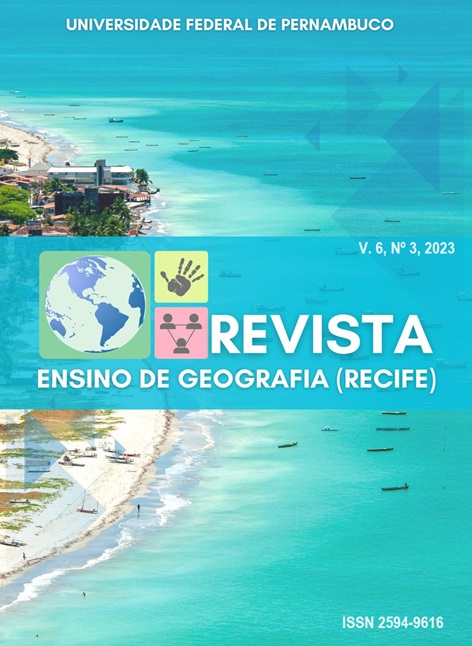The The space category of region in scientific production in teaching geography: results from a literature review
DOI:
https://doi.org/10.51359/2594-9616.2023.259518Keywords:
region, research, literature review, teaching geography, epistemologyAbstract
This paper presents a literature review about on teaching Geography from the analysis of articles about region published in national journals, considering the entire historical series until 2016, that is available online. The objective is to investigate, from the publication of articles in national journals online, the entire historical series, allowing to infer about the perspectives and trends of research on region. We found 1,458 articles on this theme, 20 of which refer to the region, in 187 journals evaluated in the Geography area, considering the Qualis Periodicals quadrennium 2013-2016. The results were discussed in two moments, the first from a quantitative profile and the second as a qualitative treatment, using Bardin's Content Analysis method (1977). Research on the State of the Art has critical and reflective character that assist in the development of new research demands, concepts and paradigms. Keywords: region; research; literature review, teaching Geography; epistemology.References
BARDIN, L. L’analyse de contenu. 8ª édition corrigée. Paris: Presses Universitaires de France, 1977. 291 p.
BRASIL. Lei nº 9394/96 de 20 de dezembro de 1996. Lei de Diretrizes e Bases da Educação Nacional (LDBEN). Diário Oficial da República Federativa do Brasil, Brasília, DF, nº 248, 23 dez. 1996.
CAPEL, Filosofia y ciencia em la geografia contemporânea. Barcelona: Barcanova, 1985.
CAPES. Qualis Periódicos. Disponível em: https://sucupira.capes.gov.br/sucupira/public/consultas/coleta/veiculoPublicacaoQualis/listaConsultaGeralPeriodicos.jsf. Acesso em: 27 jan 2017.
CASTRO, I. E. Problemas e alternativas metodológicas para a região e para o lugar. In: SOUZA, M. A. de et al. (org.) O novo mapa do mundo: natureza e sociedade de hoje: numa leitura geográfica. São Paulo: HUCITEC-ANPUR, 1997.
CASTROGIOVANNI, A. C.; CALLAI, H. C.; KAERCHER, N. A. Ensino de geografia. Práticas e Textualizações. Porto Alegre: Mediação, 1999.
CAVALCANTI, L. S. A. Geografia e práticas de ensino. Goiânia: Alternativa, 2005.
CORRÊA, R. L. Espaço: um conceito-chave da Geografia. In: CASTRO, I. E.; GOMES, P. C.; CORRÊA, R. L. Geografia: conceitos e temas. Rio de Janeiro, Bertrand Brasil, 2003, p. 15-48.
CORRÊA, R. L. Região e organização espacial. São Paulo: Ática, 1986.
FERREIRA, N. S. de A. As pesquisas denominadas “estado da arte”. Educação & Sociedade, Campinas, ano XXIII, nº. 79, p. 257-272, 2002.
FONSECA, R L. O Estado da Arte das Pesquisas em Ensino de Geografia Publicadas em Periódicos Nacionais: perspectivas e tendências. Caderno de Geografia (PUCMG), v. 29 n. 59 (2019): Outubro a Dezembro de 2019.
FRÉMONT, A. A região, espaço vivido. Coimbra: Almedina, 1980.
GOMES, P. C. da C. Geografia e Modernidade. Rio de Janeiro: Bertrand Brasil, 1996.
GOMES, P. C. da C. O conceito de região e sua discussão. In: CASTRO, I. E.; GOMES, P. C. da C.; CORRÊA, R. L. Geografia: conceitos e temas. Rio de Janeiro, Bertrand Brasil, 2003, p. 49-76.
HAESBAERT, R. Região, diversidade territorial e globalização. In: GEOgraphia, Rio de Janeiro, ano 1, n. 1, jun. 1999.
HARVEY, D. A condição pós-moderna. São Paulo: Edições Loyola, 1989.
KENSKI, V. M. Educação e Tecnologias: O novo ritmo da informação. Campinas, SP: Papirus, 2007.
LENCIONI, S. Região e Geografia. São Paulo: Edusp, 2003.
LENCIONI, S. Região e geografia: a noção de região no pensamento geográfico. In: CARLOS, Ana Fani Alessandri. (Org.). Novos caminhos da geografia. São Paulo: Contexto, 1999.
MARCON, M. T. de R. A ressignificação do conceito de região. Expressões Geográficas: Revista Eletrônica dos Estudantes de Geografia da UFSC, n. 8, ano VIII, p. 29-51. Florianópolis, agosto de 2012.
MELLO, J. B. F. A Geografia Humanista: a Perspectiva da Experiência vivida e uma Crítica radical ao Positivismo. Revista Brasileira de Geografia, 52(4), pag. 91 – 115, 1990.
MORAES, R. Uma tempestade de luz: a compreensão possibilitada pela análise textual discursiva. Ciência & Educação. v. 9, n. 2, p. 191-211. 2003.
RIBEIRO, W. C. Do Lugar ao Mundo ou o Mundo no Lugar? Terra Livre AGB, n. 11, v. 12, p. 237-242, 1993.
SANTOS, A. R. J.; CASALI, A. M. D. Currículo e educação: origens, tendências e perspectivas na sociedade contemporânea. Olhar de professor, Ponta Grossa, 12(2), 2009, 207-231.
SANTOS, M. A natureza do espaço: técnica e tempo, razão e emoção. 2. ed. São Paulo: Hucitec, 1997.
SANTOS, M. Por uma geografia nova: da critica da geografia a uma geografia crítica. São Paulo: HUCITEC, 1996.
SILVA, T. T. da. Identidades terminais: as transformações na política da pedagogia e na pedagogia da política. Petrópolis: Vozes, 1996.
SOUZA, S. E. O uso de recursos didáticos no ensino escolar. I Encontro de Pesquisa em Educação, IV Jornada de Prática de Ensino, XIII Semana de Pedagogia da UEM: “Infância e Práticas Educativas”. Arq Mudi. Anais... Maringá, 2007.
THRIFT, N. Visando o âmago da região. In: GREGORY, D. et al. (org). Geografia humana: sociedade, espaço e ciência social. Rio de Janeiro: Jorge Zahar, 1996.
TUAN, Yi-Fu. Geografia Humanística. In: CHRISTOFOLETTI, A. (org.). Perspectivas da Geografia. São Paulo: Difel, 1982.
Downloads
Published
How to Cite
Issue
Section
License
Copyright (c) 2024 Ricardo Lopes Fonseca

This work is licensed under a Creative Commons Attribution 4.0 International License.
Authors who publish with this journal agree to the following terms:- Authors retain copyright and grant the REVISTA ENSINO DE GEOGRAFIA (RECIFE) right of first publication with the work simultaneously licensed under a Creative Commons Attribution NonCommercial International 4.0 (CC BY-NC) that allows others to share the work with an acknowledgement of the work's authorship and initial publication in this journal.
- Authors are able to enter into separate, additional contractual arrangements for the non-exclusive distribution of the journal's published version of the work (e.g., post it to an institutional repository or publish it in a book), with an acknowledgement of its initial publication in this journal.
- Authors are permitted and encouraged to post their work online (e.g., in institutional repositories or on their website) prior to and during the submission process, as it can lead to productive exchanges, as well as earlier and greater citation of published work.



